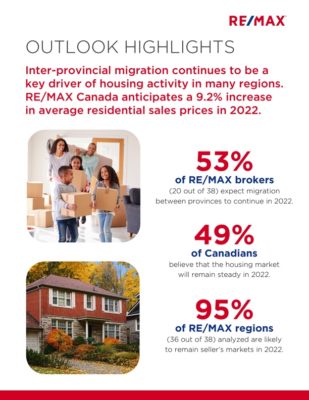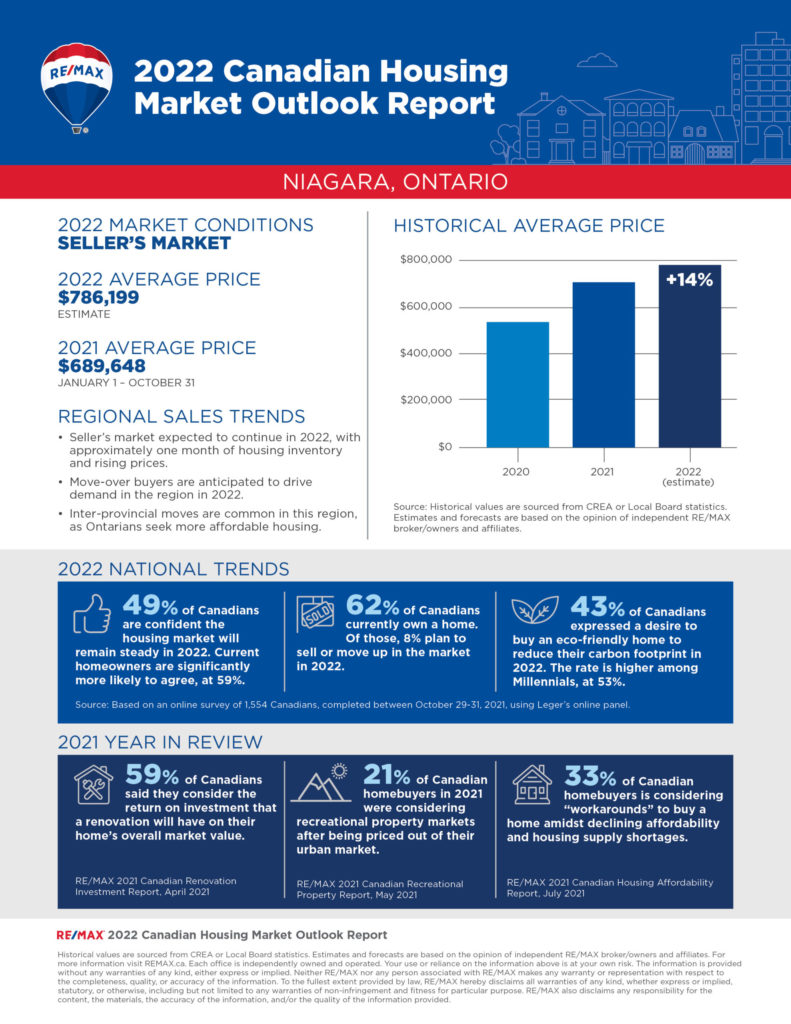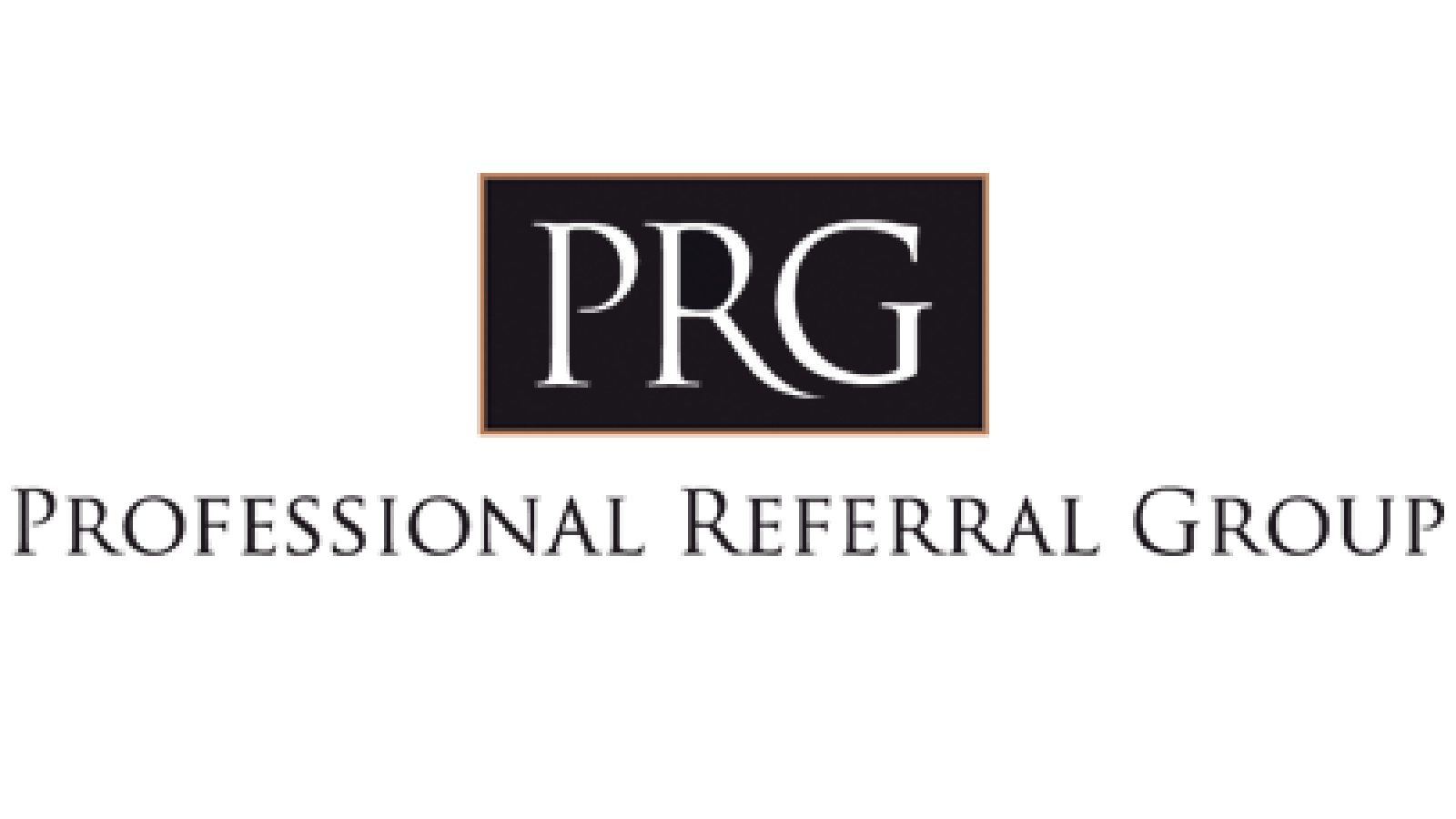 Confidence continues in Canadian real estate market, with the inter-provincial relocation trend likely to remain strong in 2022
Confidence continues in Canadian real estate market, with the inter-provincial relocation trend likely to remain strong in 2022
- Migration between provinces expected to continue in 2022, potentially impacting local Canadian real estate conditions, according to 53 per cent of RE/MAX brokers (20 out of 38)
- 49 per cent of Canadians believe the housing market will remain steady in 2022 and view real estate as one of the best investment options over the next year
- Some of the highest outlooks are anticipated for Atlantic Canada, with Moncton and Halifax projecting average residential sales prices to increase by 20 per cent and 16 per cent respectively in 2022
- 97 per cent of regions (37 out of 38) surveyed are likely to remain seller’s markets in 2022
Toronto, ON and Kelowna, BC, December 1, 2021 – RE/MAX is anticipating steady price growth across the Canadian real estate market in 2022, with inter-provincial migration continuing to be a key driver of housing activity in many regions, based on surveys of RE/MAX brokers and agents, as reflected in the 2022 Canadian Housing Market Outlook Report. The ongoing housing supply shortage is likely to continue, putting upward pressure on prices. As a result of these factors, RE/MAX Canada estimates a 9.2-per-cent increase in average residential sales prices across the country*.
“Based on feedback from our brokers and agents, the inter-provincial relocation trend that we began to see in the summer of 2020 still remains very strong and is expected to continue into 2022,” says Christopher Alexander, President, RE/MAX Canada. “Less-dense cities and neighbourhoods offer buyers the prospect of greater affordability, along with liveability factors such as more space. In order for these regions to retain these appealing qualities and their relative market balance, housing supply needs to be added. Without more homes and in the face of rising demand, there’s potential for conditions in these regions to shift further.”
Despite the global pandemic, many Canadians still feel confident in the real estate market. According to a Leger survey conducted on behalf of RE/MAX Canada, 49 per cent of respondents believe Canadian real estate will remain one of their best investment options in 2022 (59 per cent of homeowners vs. 34 per cent non-homeowners which included renters, those not looking buy, and those currently looking to purchase). Additionally, 49 per cent of respondents are confident the Canadian real estate market will remain steady next year.
“Canadians recognize the value and investment potential in their homes. However, market challenges such as rising prices and limited supply have impacted local markets from coast-to-coast, causing angst this past year among those looking to get into the market and those hoping to move up in it,” says Elton Ash, Executive Vice President, RE/MAX Canada. “Despite this, it’s encouraging to see that many are feeling confident in the housing market in 2022 and view Canadian real estate as a solid investment.”
ONTARIO
According to the RE/MAX broker network in Ontario, market activity across the province is anticipated to remain steady in 2022, with continued average price growth, although at widely varying degrees. RE/MAX brokers anticipate average sale price increases in smaller markets such as North Bay (four per cent); Sudbury (five per cent); Thunder Bay (10 per cent); Collingwood/Georgian Bay (10 per cent); and Muskoka (20 per cent), where the move-over trend has remained strong. Meanwhile, in larger markets within the province, there’s a possibility that more immigration could weigh on supply levels and prices, including Ottawa (five per cent); Durham (seven per cent); Brampton (eight per cent); Toronto (10 per cent); Mississauga (14 per cent).
When it comes to price appreciation year-over-year, there are a few regions that stood out in 2021 for their exponential increases across all property types, including Brampton, which rose from $869,107 in 2020 to $1,085,417 in 2021 (25 per cent); Durham from $706,818 in 2020 to $914,48 in 2021 (29 per cent); and London from $487,500 in 2020 to $633,700 in 2021 (30 per cent). In comparison, Toronto experienced a modest seven-per-cent increase year-over-year ($986,085 in 2020 to $1,054,922 in 2021).





















